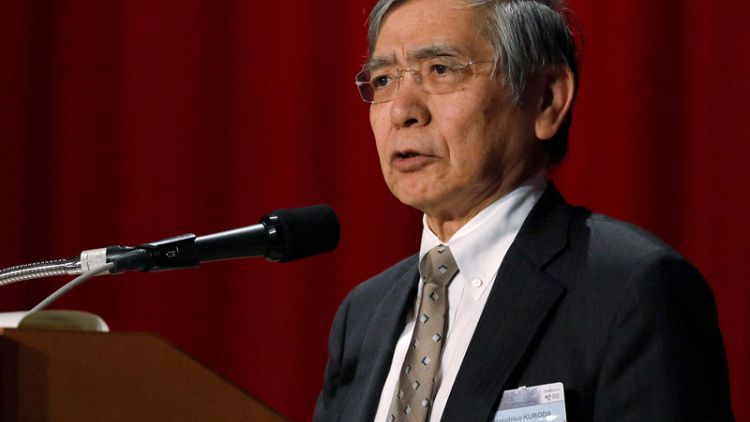By Leika Kihara
TOKYO (Reuters) - Bank of Japan Governor Haruhiko Kuroda on Tuesday ruled out the chance of abandoning negative interest rates in the near-term, saying they are necessary to accelerate inflation to his 2 percent inflation target.
Kuroda also said there was no need to ramp up stimulus, arguing that the current ultra-loose programme was enough to accelerate inflation to the BOJ's target.
"There's no need to take additional steps. What's important is to ensure our policy is sustainable, with an eye on balancing its pros and cons," Kuroda told parliament.
Some market players speculate the BOJ may ditch negative rates in coming months to mitigate the pain that ultra-low rates are inflicting on financial institutions via narrowing margins.
Adding fuel to such a view was an academic paper released by a BOJ-affiliated think tank earlier this month that said ditching negative rates could help accelerate inflation.
Kuroda said he welcomed the fact various discussions and analyses are made on the BOJ's policy. But he stressed the bank's resolve to sustain its massive stimulus programme.
"I know there is various debate on the BOJ's negative rate policy," Kuroda said, when asked by an opposition lawmaker about the academic paper.
"But for the time being, it's a necessary step that is part of our large-scale monetary easing programme," he said.
The BOJ introduced negative rates in 2016. It now guides short-term rates at minus 0.1 percent and long-term rates around zero percent to achieve its elusive 2 percent inflation target.
Subdued inflation has forced the BOJ to maintain the radical stimulus programme despite the rising costs, such as the hit to financial institutions' profits from years of near-zero rates.
The BOJ trimmed its price forecasts in October and now projects inflation to fall short of its target at least until the fiscal year ending in March 2021.
"The chance of inflation hitting 2 percent any time during fiscal 2020 is slim," Kuroda said.
"But wage and price growth will likely accelerate" if the economy remains in good shape and the jobless rate stays at record-low levels, he added.
(Reporting by Leika Kihara; Editing by Chris Gallagher and Kim Coghill)



